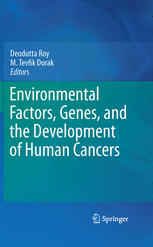

Most ebook files are in PDF format, so you can easily read them using various software such as Foxit Reader or directly on the Google Chrome browser.
Some ebook files are released by publishers in other formats such as .awz, .mobi, .epub, .fb2, etc. You may need to install specific software to read these formats on mobile/PC, such as Calibre.
Please read the tutorial at this link: https://ebookbell.com/faq
We offer FREE conversion to the popular formats you request; however, this may take some time. Therefore, right after payment, please email us, and we will try to provide the service as quickly as possible.
For some exceptional file formats or broken links (if any), please refrain from opening any disputes. Instead, email us first, and we will try to assist within a maximum of 6 hours.
EbookBell Team

5.0
78 reviewsCancer is a complex disease. Only 5-10% of human cancers are hereditary in nature. Many of us think of environmental agents when we think of carcinogens. The environment includes all that surrounds us, and environmental influences include not only chemical, physical and biological toxicants, but also diet and lifestyle. In this broadest sense, the environment contributes substantially in the development of human cancer. This book will describe how environment contributes to malignant transformation leading to profound changes in the genetic and signaling networks that control the functioning of the cell. It will critically discuss the understanding of the effects of environment on the development, progression and metastasis of cancer with current knowledge of the signaling networks that support functioning of transformed human cells. Genes and environmental factors that influence the origins of cancer are not necessarily the same as those that contribute to its progression and metastasis. Susceptibility gene variants for each specific cancer are being identified with emerging evidence of gene–environment interaction. Gene-environment interactions will be discussed through each specific cancer-based approach to address the question of how genetic variations can influence susceptibility to the individual type of cancer. It will also highlight and summarize epigenetic changes that increase the risk for susceptibility to a particular type of cancer, particularly in the presence of specific environmental factors. Thus, this book will contain chapters from the world’s experts focused on the current evidences that support the role of environment in the cancer etiology and in the growth of malignant lesions, and discuss who may be susceptible to environmental influences.